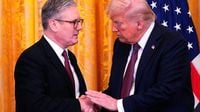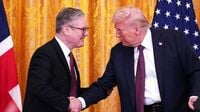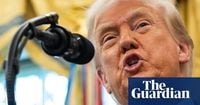On Thursday, May 8, 2025, Donald Trump is set to announce that the United States will agree to a trade deal with the United Kingdom, marking a significant step in transatlantic relations amid ongoing global trade tensions. The announcement comes after a series of negotiations and follows Trump's recent imposition of tariffs on various trading partners.
A government source confirmed to Sky News that initial reports regarding the agreement, which were first detailed in The New York Times, are accurate. This "heads of terms" agreement serves as a preliminary arrangement, indicating a substantive step towards a full trade deal between the two nations.
Shortly after news of the potential agreement broke, the value of the British pound rose by 0.4% against the US dollar, signaling market optimism regarding the deal. Trump had previously hinted at the announcement on his Truth Social platform, stating that a major trade deal would be revealed in the Oval Office at 10 AM local time (3 PM UK time) on Thursday, without specifying the country involved.
In his post, Trump described the upcoming news conference as concerning a "MAJOR TRADE DEAL WITH REPRESENTATIVES OF A BIG, AND HIGHLY RESPECTED, COUNTRY. THE FIRST OF MANY!!!" This declaration has fueled anticipation and speculation about the nature and implications of the agreement.
The negotiations between the US and UK have intensified since Trump announced his "liberation day" tariffs on April 2, which included a 10% tariff on most countries, including the UK, along with higher "reciprocal" tariffs for many trading partners. However, the UK was not subject to these higher tariffs due to its trade surplus with the US, although it faces a 25% tariff on all cars and steel and aluminum imports.
A UK official indicated that significant progress has been made toward a trade deal that would likely involve lower tariff quotas on steel and cars. This development comes as the UK government has been actively seeking to lower tariffs since Trump's initial tariff announcements last month.
Amidst this backdrop, Prime Minister Sir Keir Starmer is expected to make a statement regarding the deal later on the same day. A spokesperson from Downing Street emphasized that the Prime Minister will act in Britain's national interest, focusing on benefits for workers, businesses, and families.
The urgency of these negotiations is underscored by the upcoming UK-EU summit scheduled for May 19, 2025. Observers suggest that securing a trade deal with the US prior to this summit could enhance Starmer's position in negotiations with the EU, as it would demonstrate a proactive approach to fostering international trade relationships.
In a related context, the US has been engaged in escalating trade tensions with China, having raised tariffs on Chinese goods to 145%, while Beijing retaliated with levies of 125%. US Treasury Secretary Scott Bessent and US Trade Representative Jamieson Greer are set to meet their Chinese counterparts in Switzerland to discuss the ongoing trade war, which adds another layer of complexity to the US's international trade strategy.
As the Trump administration pushes for rapid trade agreements, it has also been exploring potential deals with other nations, including India, South Korea, and Japan. Trump has stated that he and his administration will review possible trade deals with these countries over the next two weeks.
Despite the momentum toward a US-UK trade agreement, there remains uncertainty regarding the specifics of any deal. Experts suggest that the announcement may not represent a finalized agreement but rather a framework for further negotiations. Timothy C. Brightbill, an international trade attorney, noted that the announcement will likely identify key issues for discussion in the coming months.
Starmer has made clear that while seeking a trade deal with the US, the UK will not compromise on food production standards to facilitate increased trade of US agricultural products. This stance reflects the UK government's intention to maintain its regulatory standards while pursuing economic opportunities.
In the broader context of global trade, the UK recently secured a separate trade deal with India, aimed at easing the export of British goods like whisky and cars to India and reducing taxes on Indian clothing and footwear exports to the UK. This deal signifies the UK’s strategic efforts to diversify its trade relationships following Brexit.
As the clock ticks down to Trump's announcement, the stakes are high for both the US and UK. The outcome of these negotiations could significantly impact economic relations, trade policies, and the broader geopolitical landscape in the months ahead.
With the trade deal on the horizon, both nations appear poised to redefine their economic partnership, potentially setting a precedent for future agreements in a rapidly changing global trade environment.






